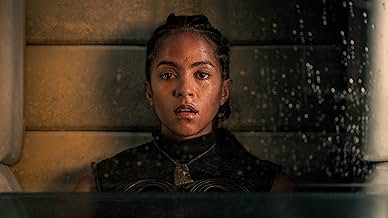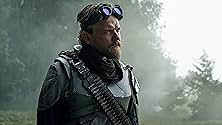La humanidad ha sido dividida en numerosos planetas por toda la galaxia bajo el mandato del Imperio Galáctico.La humanidad ha sido dividida en numerosos planetas por toda la galaxia bajo el mandato del Imperio Galáctico.La humanidad ha sido dividida en numerosos planetas por toda la galaxia bajo el mandato del Imperio Galáctico.
- Nominado a 2 premios Primetime Emmy
- 3 premios ganados y 29 nominaciones en total
Explorar episodios
Resumen
Reviewers say 'Foundation' is a visually impressive sci-fi series with strong performances, especially from Lee Pace and Jared Harris. However, it faces criticism for significant deviations from Isaac Asimov's original books, including changes in character genders and storylines. Some viewers appreciate the modernization, while others feel it loses Asimov's essence. The series is lauded for its production values and epic scope but faulted for inconsistent writing and pacing. Non-book readers tend to enjoy it more, while original fans express disappointment.
Opiniones destacadas
... Its name didn't need to be Foundation. Imo, it's about 50% Asimov and the rest is a combo of soap opera, sc-fi-imperial politics, CGI explosions and Webb-esque space vistas. Heck, you could claim several other writers' materials were influences. Lots of this series is purely mainstream, outer space SF.
But it's excellent SF! Captivating sub-plots, likable characters and gorgeous images are extremely entertaining! In its own right, it is a superb show. Aye, and there's the rub... A "show" isn't necessarily literature. Michael Crichton and James Patterson were/are graphic oriented writers, evoking a "screenplay" feel in their fiction, which isn't meant as a detraction. Excellent easy read authors! Asimov isn't as frugal a wordsmith, however, and there are probably as many different visual interpretations of scenes in his books, as there are readers of his books. But then again, this is series is just loosely "based" on his work, whether it is expressly acknowledged or not.
But it's excellent SF! Captivating sub-plots, likable characters and gorgeous images are extremely entertaining! In its own right, it is a superb show. Aye, and there's the rub... A "show" isn't necessarily literature. Michael Crichton and James Patterson were/are graphic oriented writers, evoking a "screenplay" feel in their fiction, which isn't meant as a detraction. Excellent easy read authors! Asimov isn't as frugal a wordsmith, however, and there are probably as many different visual interpretations of scenes in his books, as there are readers of his books. But then again, this is series is just loosely "based" on his work, whether it is expressly acknowledged or not.
Magnificent bouts of rich storytelling often feel diluted by cheap and pointless moments of juvenile entertainment. While the core of this series held the potential to become an ode to the greatest science-fiction writer of all times, it would appear that Apple couldn't keep itself from interfering in their typical (biased) politically correct, family friendly fashion. You stand on the shoulders of a giant, and behind that giant stand millions of minds inspired by a vision of the future the whole of humanity can rally behind. The implications of the existential questions raised by Asimov are not PG-rated, this shouldn't be either.
Simple, just pick the most famous scifi book series of all time, by one of the best known and loved authors, and call your series after its title. Then, to save having to think up names, take them from the books and apply them to your characters who don't even have to be the same gender nor have the same attributes. Then take the shortest plot summary of the books that you can find and sprinkle it into your existing, wild story. For good measure include a robot that is the antithesis of the one that the whole series is based around and have it break all of Asimov's laws of robotics (the very things that a huge number of his stories revolved around and the development of which were his trademark).
I would have watched the show anyway, and possibly have enjoyed it on its own merits, however the constant reminder that it is supposed to be foundation is sickening. The expectation of clever psychohistorical prediction never appears, just some lip-service to mathematics and a prime radiant that doesn't do what Asimov intended. The story is pedestrian with all the logic stripped out and replaced by mumbo jumbo, whereas Asimov's was thoughtful and clever.
If Apple tv went through it, and renamed the characters and planets and renamed it Fall of Empire (or something), the plot is so divergent from the story of Foundation that no one would recognise it as such.
I would actually be able to enjoy it if they did that. Instead, I will keep watching and feel increasingly disappointed. I had hoped season 2 would bring the Seldon plan back on track but it seems there is even more divergence red in the plot! Or, at least, what passes for plot.
I would have watched the show anyway, and possibly have enjoyed it on its own merits, however the constant reminder that it is supposed to be foundation is sickening. The expectation of clever psychohistorical prediction never appears, just some lip-service to mathematics and a prime radiant that doesn't do what Asimov intended. The story is pedestrian with all the logic stripped out and replaced by mumbo jumbo, whereas Asimov's was thoughtful and clever.
If Apple tv went through it, and renamed the characters and planets and renamed it Fall of Empire (or something), the plot is so divergent from the story of Foundation that no one would recognise it as such.
I would actually be able to enjoy it if they did that. Instead, I will keep watching and feel increasingly disappointed. I had hoped season 2 would bring the Seldon plan back on track but it seems there is even more divergence red in the plot! Or, at least, what passes for plot.
I remember watching the first couple episodes and not being very impressed. Not necessarily hating it, but not intrigued. It felt like a very traditional sci-fi series, akin to dune or star wars. A year or two later, i tried watching again... and now i'm somehow roped in and invested and binged most of the show well into 4 in the morning.
Great visual effects, music, vfx, product and costume design, even acting. Really intriguing clone concept (and a very obvious anagram for Cleon). Fantastic world building and i appreciated the non-linear storytelling. Interested to see where this series will take us!
Great visual effects, music, vfx, product and costume design, even acting. Really intriguing clone concept (and a very obvious anagram for Cleon). Fantastic world building and i appreciated the non-linear storytelling. Interested to see where this series will take us!
Since immersing myself in Foundation Season 1, I've embarked on a comprehensive reading journey through Isaac Asimov's wider literary universe, including the Robot series, Empire novels, and the Prelude and Forward the Foundation prequels, all consumed in the author's recommended order. Now, having completed Season 2, I can confidently say it maintains the captivating momentum of the first, albeit after an initial one-to-three-episode warm-up. This remains one of the most entertaining series I've watched recently, and my deep engagement with the source material hasn't altered my high regard for the show's quality.
The decision to opt for a looser adaptation of Asimov's works was, in my view, a stroke of genius. This approach allows for a compelling new narrative to unfold, preserving the spirit and core themes of the books without ever threatening to dilute or ruin the original stories. I find this strategy to be remarkably thoughtful and genuinely faithful to Asimov's unique authorial vision. His novels consistently explored the intricacies of individual lives set against the grand tapestry of a galactic empire, deeply intertwined with the vast political machinations of planets and ruling powers. As long as this fundamental exploration remains central, the show consistently delivers.
While certain elements of the established lore, such as the detailed history of robots or the nuances of Hari Seldon's relationship with the Empire, have been considerably re-imagined-perhaps to lend a more "fashionable" or grand aesthetic, reminiscent of the regal spectacle in Game of Thrones-these changes are not so significant as to be problematic. Indeed, they provide the writers with the creative latitude to craft distinct, yet equally compelling, plotlines, ensuring the show's longevity without impinging upon the integrity of the original novels. The series masterfully blends the more intimate, "soapy" character dynamics often found in the prequels with the expansive, interwoven narrative scope of Foundation itself, a combination that works exceptionally well, despite a few endearing moments of cheese. Furthermore, the show is replete with dazzling spectacle and impressive special effects-a welcome change from many series that often lack in this department-making it a visually stunning and thoroughly enjoyable experience, particularly on a large screen.
The decision to opt for a looser adaptation of Asimov's works was, in my view, a stroke of genius. This approach allows for a compelling new narrative to unfold, preserving the spirit and core themes of the books without ever threatening to dilute or ruin the original stories. I find this strategy to be remarkably thoughtful and genuinely faithful to Asimov's unique authorial vision. His novels consistently explored the intricacies of individual lives set against the grand tapestry of a galactic empire, deeply intertwined with the vast political machinations of planets and ruling powers. As long as this fundamental exploration remains central, the show consistently delivers.
While certain elements of the established lore, such as the detailed history of robots or the nuances of Hari Seldon's relationship with the Empire, have been considerably re-imagined-perhaps to lend a more "fashionable" or grand aesthetic, reminiscent of the regal spectacle in Game of Thrones-these changes are not so significant as to be problematic. Indeed, they provide the writers with the creative latitude to craft distinct, yet equally compelling, plotlines, ensuring the show's longevity without impinging upon the integrity of the original novels. The series masterfully blends the more intimate, "soapy" character dynamics often found in the prequels with the expansive, interwoven narrative scope of Foundation itself, a combination that works exceptionally well, despite a few endearing moments of cheese. Furthermore, the show is replete with dazzling spectacle and impressive special effects-a welcome change from many series that often lack in this department-making it a visually stunning and thoroughly enjoyable experience, particularly on a large screen.
New and Upcoming Sci-Fi and Fantasy
New and Upcoming Sci-Fi and Fantasy
From popular franchises to brand new worlds of exploration, science fiction and fantasy stories are more popular than ever. Check out our list of the best and brightest new and upcoming movies and series.
¿Sabías que…?
- TriviaAsimov's Foundation was originally published as a short story series in Astounding Magazine between May 1942 and January 1950, based on ideas in Edward Gibbon's History of the Decline and Fall of the Roman Empire.
- Créditos curiososThe opening titles is a montage of radiant energy particles forming various shapes.
- ConexionesFeatured in Late Night with Seth Meyers: Paul Rudd/Jared Harris/Nate Smith (2021)
Selecciones populares
Inicia sesión para calificar y agrega a la lista de videos para obtener recomendaciones personalizadas
July 2025 TV and Streaming Premiere Dates
July 2025 TV and Streaming Premiere Dates
"Foundation" and "Dexter: Resurrection" are two of this month's most anticipated TV releases. Check out our July calendar for more!
Detalles
- Fecha de lanzamiento
- Países de origen
- Idioma
- También se conoce como
- Фундація
- Locaciones de filmación
- Productoras
- Ver más créditos de la compañía en IMDbPro
- Tiempo de ejecución1 hora
- Color
- Relación de aspecto
- 2.00 : 1
Contribuir a esta página
Sugiere una edición o agrega el contenido que falta










































